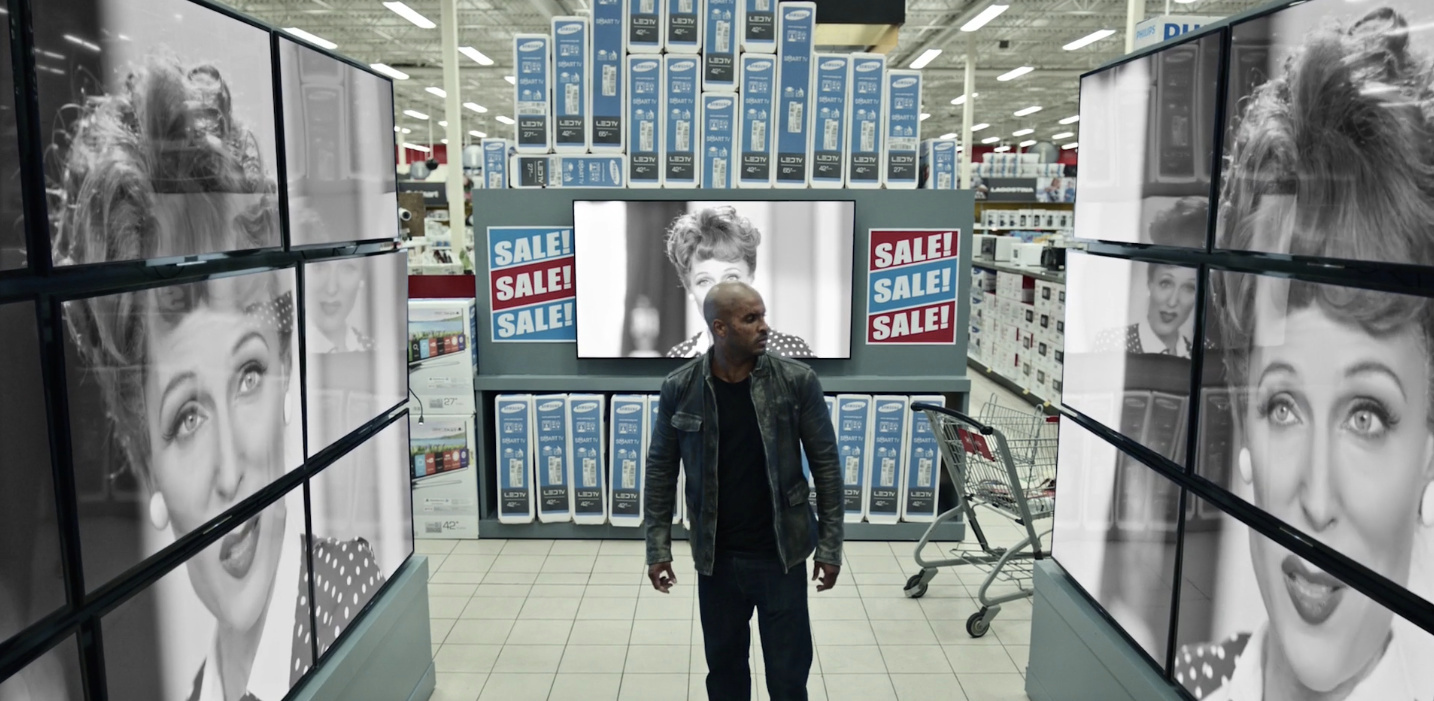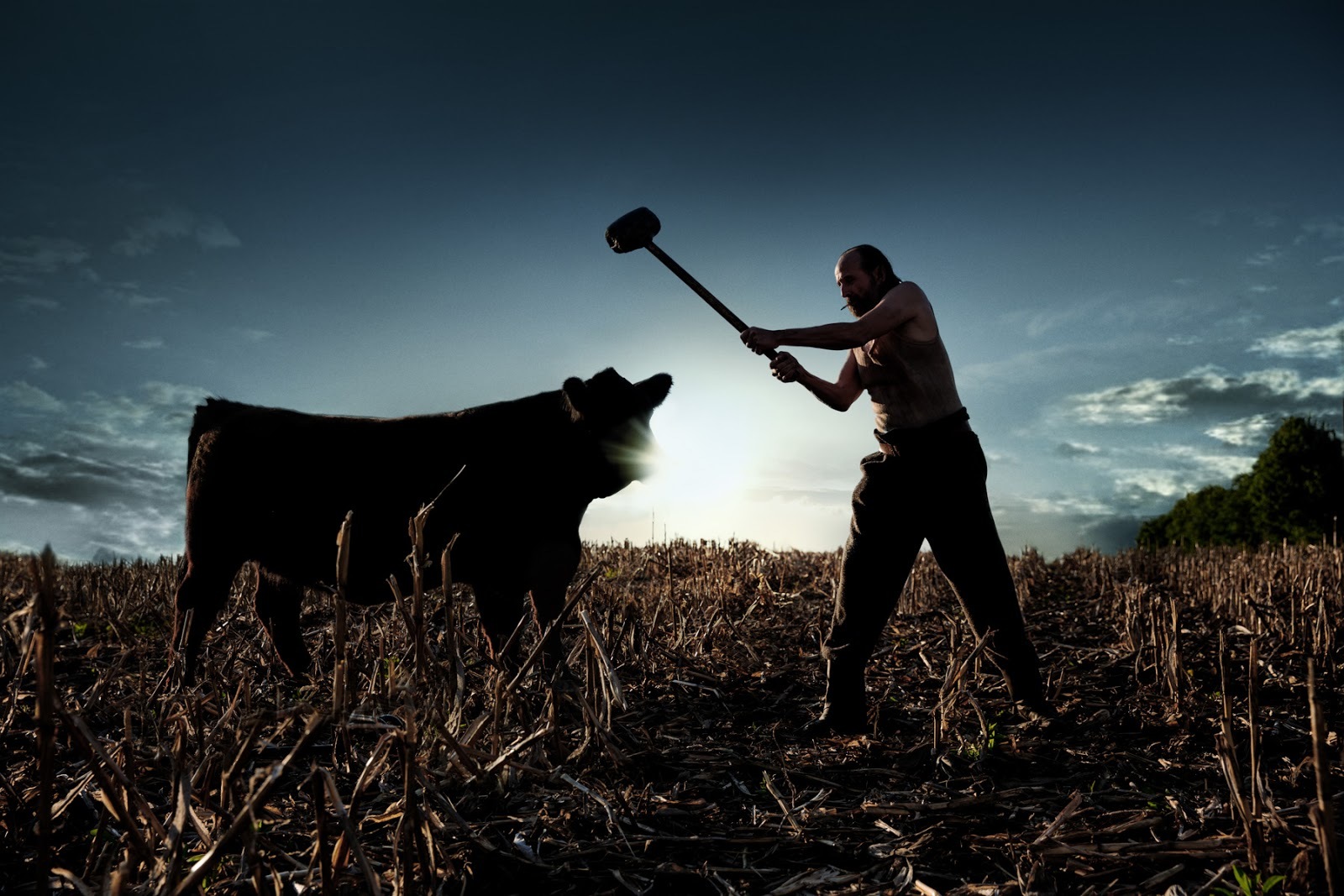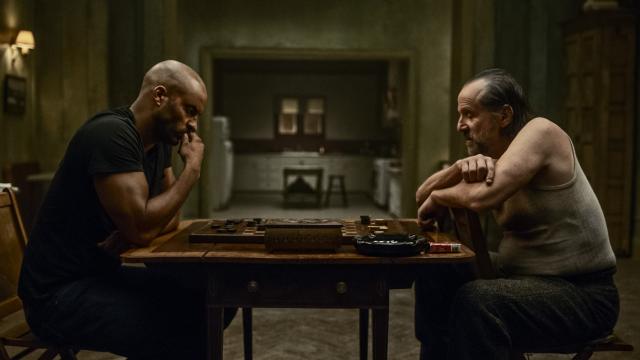Word to the wise: If you suddenly find yourself on a road trip with a celestial con man, don’t play checkers with a god who used to kill things with a sledgehammer.
Shadow plays checkers against Czernobog. All images courtesy of Starz

The second episode of American Gods opens with the first appearance of Mr Nancy, also known as West African trickster god Anansi, played by Orlando Jones. He manifests in the cargo hold of a slave ship after an abducted African man prays to him. Mr Nancy responds to the supplication with a cruel rundown of how screwed black people are going to be in America over the course of centuries. After detailing the particulars of chattel slavery, discrimination and state oppression, the trickster god exhorts the chained men to revolt so they can die as “a sacrifice for something worthwhile”.
They rise up and “let it all burn,” as Mt. Nancy puts it; the African men and their Dutch enslavers all die and we see Mr Nancy back in spider form, crawling ashore onto the North American continent. The end of that sequence highlights something that seems like it’s going to be a key aspect of American Gods, which is that these deities can be callous toward humanity. Worship is their sustenance and all they care about is getting enough faith to keep on existing. Mr Nancy asked the Africans to be a sacrifice for something worthwhile. Was the “something worthwhile” he talked about resistance to being treated like property? Or was it his own chaos-loving self? Either way, he gets what he needs and that’s all that matters to him.
Shadow, however, has different needs, like getting his broken body repaired. When we catch up with the show’s main character, he’s getting his wounds stapled back together after his near-death experience hanging on the tree in the Bone Orchard. After the treatment’s done, he confronts Wednesday back at the hotel they’re staying at. The con man (or con god, if you’d prefer), fresh off seducing a much younger woman, claims ignorance of what exactly happened and throws more doublespeak at Shadow. But he admits that he knows of Technical Boy and says he has a plan to deal with him.
A painful bedtime follows for Shadow wherein he experiences a sleeping encounter with his dead wife Laura. He tells her that he’s been told she died and she replies by telling him that he’s just having a bad dream. Shadow then returns to the home they shared and packs it up, walking through memories of the life he and Laura shared. The heartfelt reverie hits a speed bump when he scrolls through to find a dick pic on her phone — a reference to her infidelity, revealed in the premiere — and Wednesday shows up to tell Shadow that he shouldn’t keep on holding on to memories of those who did him dirty.
Another road trip follows — there’s going to be a lot of these on AmGods, it seems — and more dialogue about charisma and storytelling generating belief. Wednesday wonders about Shadow’s obsession with coin tricks but tells him he doesn’t have the personality to be a magician. He then adds, “You can’t weave the stories necessary for belief unless you have a little personality,” which leaves Shadow mildly insulted. The cryptic codger explains that they’re going to be meeting with “a number of people pre-eminent in their respective fields”, which will be followed by a gathering in one of the most important places in the country. The pair make a pit stop so that the latter can have a quick meeting while his employee picks up a few things. This is where the TV starts talking to Shadow.

During a supply run where Shadow throws a bunch of state maps, vodka and other sundries into a shopping cart, a re-run of I Love Lucy starts addressing him directly by name. Shadow yanks out an HDMI cable of the TV but it just keeps on talking. Lucille Ball — or rather, Lucy Ricardo, as the character played by Gillian Andersen corrects him — explains who and/or what she is: The entity created from all the devotion people have been giving their radios and TV screens for more than 100 years. “They sit side by side, ignore each other and give it up to me… Time and attention. Better than lamb’s blood,” not-Lucy says. There’s that talk of sacrifice again. This is new god Media, of course, and she goes on to say that she’s part of a group of rising powers who are ascendant in the present and will own the future. She wants Shadow on their side, apologises for his treatment at the hands of Technical Boy, and promises him anything he could want — an offer which includes a look at the legendary television icon’s breasts.
Creeped out as all hell by this encounter, Shadow goes back to the diner, brushing past a brown-skinned man hiding glowing eyes behind sunglasses, and nervously tells Wednesday that he’s fearing for his sanity. Bizarre things are happening to Shadow and he’s struggling to understand it all. Wednesday’s responses — crustily dismissive and philosophical — show the difference between how gods and mortals think. He says, essentially, that the weirdness means the universe is paying attention to Shadow, which is a good thing. For a god, being ignored is a fate worse than death (although to be fair, many gods have been known to come back from the dead).
Wednesday investigates the bag of stuff that Shadow got at the store, but crankily objects to the burner phone his body man picked up. He tosses it out the window and waxes on about the drama of the telegraph, noting how you had to pick words carefully because they charged by the word. Then he laments that invention as the dawn of the “goddamn Information Age”.
A transitional scene sends the camera up into a field of stars where we see a man floating in space with a distinctly visible erection. So, yes, we’re going back to Bilquis’ place, where more worship is going on. That means sweaty humping and sex-sorption of hapless folks — both men and women — who thought they’d lucked into the best Tinder dates of their lives. After all the writhing around is done, Bilquis lies on a pillow with tears streaming down her face. We then see a quietly meaningful moment where Bilquis revisits her own antiquarian past, visiting a museum where her golden fineries of old are laid out on display. Her mournful expression tells the viewer that she remembers what she once was — the Queen of Sheba, whose beauty and power was legend — and that she knows that she is no longer that.

After getting to Chicago, Shadow and Wednesday call on a household of Slavic gods — Czernobog (Peter Stormare) and the Zorya sisters, the eldest of which isn’t happy to see Wednesday. Grey-haired Zorya Vechernyaya (Cloris Leachman) grumbles about needing to get more groceries but becomes more agreeable after guzzling an entire bottle of vodka in one pull. Wednesday has come to enlist Czernobog for the coming conflict between the old and new gods, but the grimy Slavic deity crankily refuses to have anything to do with Wotan, as he calls him.
Czernobog’s been working at a slaughterhouse. He calls the modern methods of cow slaughter “organic bullshit” and misses the days when he would swing a sledgehammer down on an animal’s head and skillfully end its life with one quick blow. After a dinner where he holds forth with a lot of racially uncomfortable blather, Czernobog challenges Shadow to a game of checkers. He also offers a wager: If Shadow wins, he’ll go where Wednesday wants; if Czernobog wins, he gets to swing his neglected rusty hammer at Shadow’s skull, just like he used to do at the slaughterhouse. Shadow doesn’t win the game and the episode ends with Czernobog, saying, “Shame, you’re my only black friend.”
This episode puts Shadow on the runway to a different plane of existence. His experiences in the premiere with Wednesday, Mad Sweeney and Technical Boy have all impacted with him with tangible experiences. He may have been surprised and baffled by them, but he doesn’t doubt they happened. The interaction with Media is something different — something much more unreal than an uncannily adept con man or an overly aggressive leprechaun. Wednesday’s talk with him in the diner references sacrifice yet again, essentially saying that he’ll push on into something more glorious than his existence if he accepts that all of this is really happening. All it will cost is a little sanity.
It’s the reason that Shadow’s memories of Laura are shot in intentionally confusing ways. They flicker between past and present but also remind us of the way she’s been popping up in his dreams, symbolising a semi-porous membrane between the real and surreal. The moments where Shadow’s packing up things in his old house are also clearly meant to serve as signifiers of someone saying goodbye to a previous version of himself. He can’t escape the fact that he’s on a weird trip now and that he isn’t going to be the same person whenever his journey ends.
It isn’t just him who reckons with what’s come before. The opening “Times Past” flashback with Mr Nancy, with its killer line about the Africans “still thinking they’re people”, was also about the sudden shifts fate foists on us. It’s the same for the gods: Czernobog reminisces about killing with skill, saying “to give a good death is art,” and Bilquis’s museum visit are both recollections of better times in the gods’ pasts. This is a time of change and most of the characters we’ve met so far are unhappy about it. The only ones looking forward to the days to come are the new gods, and they’re being jerks about it.
Assorted Musings:
- Gillian Andersen’s first appearance as Media channels — oh, hey, that’s a pun — a primal sense of allure. I marvelled at the choices of her Lucy performance. The cant of her head, her slight Southern lilt, her measured volume — they all made it impossible for me to stop watching her. A neat trick for someone playing a goddess of the screen.
- Media’s intro and Bilquis’ omnivorous sex sequence aside, the weirdness meter didn’t get much of a workout here. We mostly stayed in mundane environments, with the notable exceptions being the scene transitions, like Wednesday blowing dandelion seeds that float into thunderclouds and spark lightning, Floating Erection Guy, and Czernobog’s quick pastoral cow-killing moment.
- My favourite moments of dialogue came from Wednesday and Shadow’s talk in the diner:
Shadow: “I think I’m losing my mind.”
Wednesday: “When will you know for sure?”
and…
Wednesday: “This, on top of your other adventures, it’s an onset of strange. Fair cause for consternation, unless, strange is a new language and what we’re doing here is… vocabulary building.”
Shadow: “They threatened to reprogram reality. Is that what this is? Are they just fucking with my head? [angrily] Are you fucking with my head?!”
Wednesday: “There are bigger sacrifices one might be asked to make than going a little mad.”
